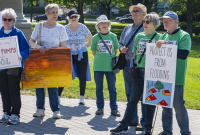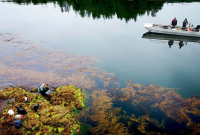Support strong Canadian climate journalism for 2025
Environment Minister Steven Guilbeault has issued an emergency interim order to the petrochemical industry in southern Ontario, home of Canada’s Chemical Valley.
The order requires petrochemical facilities in Sarnia with concentrations of dangerous levels of benzene to implement abatement measures, including fully closed vents and vapour control on storage tanks that contain the chemical. The order will last 14 days, but can be extended.
The move follows several benzene leaks that have posed dangerous health threats, immediately and long-term, to the local First Nation located five kilometres from the city.
Benzene is highly toxic and a known carcinogen used in chemical manufacturing to produce certain types of plastics.
“We have acted promptly,” Guilbeault told reporters in Montreal on Friday regarding the recent benzene emissions. “I would challenge you to try to find instances where the federal government was so quick to act in the history of the country.”
The rapid reaction was initiated by the environment ministry in collaboration with Health Canada, Guilbeault said. The order followed meetings between Aamjiwnaang First Nation leadership and Guilbeault three weeks ago, he added.

Aamjiwnaang First Nation is nestled within Chemical Valley, home to over 60 petrochemical plants — 40 per cent of Canada’s petrochemical industry. The sites are responsible for millions of tonnes of greenhouse gas emissions and have made the area Ontario’s worst pollution hot spot.
For decades, Aamjiwnaang has experienced dangerous air quality conditions arising from the plants, which the nation says has caused higher rates of cancer and other diseases. In recent months, poor air quality conditions have spiked according to monitoring by the province, the federal government and the First Nation.
Recently, levels of pollution have led to temporary closures of key community buildings within the First Nation, including the band office, daycare and resource centre.
The interim order comes after the Friday release of a “What We Heard” public consultation update with Aamjiwnaang community members on developing regulations to reduce dangerous benzene emissions in the region.
Proposed regulations, still in development, will aim to reduce the impact of benzene from the petrochemical plants by installing abatement equipment and setting daily and annual limits for the release of petrochemical gases. The regulations will include a timeline for these changes that will also further reduce air pollution.
“Aamjiwnaang is confident that this Order will not only add to the protection of the air quality in Aamjiwnaang, but also relieve the burden placed upon the air shed in the Sarnia–Lambton area,” the First Nation’s leadership said in a statement.
Last month, several Aamjiwnaang community members and leadership representatives descended on Ottawa to push world governments to give Indigenous nations a seat at the table for global plastic treaty negotiations.
“Just last week, elevated benzene levels in the air from the Ineos Styrolution facility caused several members of our community to fall ill. This is not acceptable, nor is it an isolated event,” CJ Smith-White, an elected councillor of Aamjiwnaang First Nation, said in a statement last month. “Our people, the original people here, the Anishinaabe, have been exposed to environmental racism for more than 100 years.
“Our community and our lands have become a sacrifice zone for the benefit of industry.”
— with files from John Woodside
Matteo Cimellaro / Canada’s National Observer / Local Journalism Intiative






Comments
You have a typo in your footer: "Local Journalism Intiative" (Initiative)
I wouldn't mention it except Max linked this story in X (formerly Twitter) to demonstrate disclosure of Local Journalism Initiative funding. Sorry...